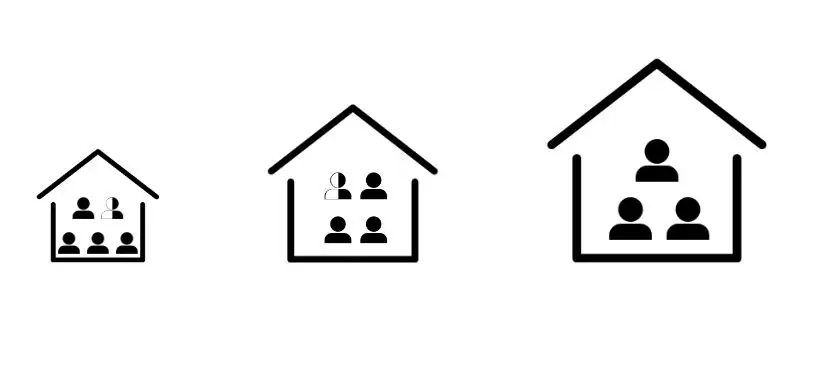
It’s essentially the same concept but with a totally different approach, taking both benefits and costs into account. Curious about how Coliving in NYC differs from shared living? Continue reading to find out.
Co living involves a group of individuals sharing a specially designed living space. In this setup, each resident has their own room (and occasionally their own bathroom), while communal areas like the balcony, kitchen, and living room are shared. The Co living provider handles maintenance issues (like water leaks or air conditioning repairs), roommate disputes, and other concerns, and is also responsible for addressing your needs.
On the other hand, a shared apartment involves a group of people living together in a standard apartment building that isn’t specifically designed for shared living. If you encounter issues with your rental property’s equipment or have disputes with your roommates, you’ll often need to handle these problems on your own, as landlords typically do not address these “routine” matters.
To clarify the differences between Co- iving and shared housing, here is a comprehensive list comparing the two, as well as the benefits you can expect from opting for co-living.

Benefits of Co living: Co living offers a modern approach to housing, handling the complexities of home ownership while fostering personal connections. It’s a different experience compared to living alone or with traditional roommates.
Space and Amenities: In Co living arrangements, each resident has a private room of varying sizes, with shared common areas that might include indoor and outdoor living spaces like bathrooms, laundry rooms, balconies, kitchens, and living rooms. Co living can be likened to modular homes, where you pay only for what you need. Prefer a smaller space? Choose a smaller room with fewer amenities and live alone or with roommates. Need more space with a kitchen? Opt for a studio or a larger studio apartment with a full kitchen, suitable for two people. Shared houses, on the other hand, are typically designed for family living. Each resident has their own room, but the bathrooms and kitchen are shared. Most bedrooms are small, and there’s usually only one “master” bedroom, which may or may not have an en-suite bathroom.
Lower Upfront Costs: With Co living, you avoid the cost of furnishing an apartment, as it comes fully furnished. Rent includes utilities, maintenance, and more, providing a clear and fixed monthly payment. While traditional rentals may seem like the only option, Co living offers more benefits at affordable rates. If you’re considering whether to live alone or with a roommate, Co living might be your ideal choice, offering furnished accommodations, flexible terms, and a chance to build meaningful social connections.
Rent: Many Co living companies include furniture and basic utilities like internet, water, electricity, maintenance, and regular cleaning in the rental price. This means you won’t have to deal with monthly utility bills or setup issues—just contact the service department for repairs, and they’ll handle it. In shared housing, utilities (such as water, gas, and internet) and costs for additional plumbing, furniture, or maintenance are not included in the rent. Tenants are responsible for these expenses and managing repairs, which means coordinating with your roommates to handle issues and split costs.
Location: When choosing between Co living and shared living, location can impact your daily commute and overall convenience. Co living homes are often located on the outskirts of the city, whereas many Co living apartments are centrally located in fashion or business districts.
Flexibility: Co living provides flexibility by eliminating long-term rental commitments. You’re not tied to a minimum lease period, offering you more freedom and adaptability.
Welcoming Experience: Adjusting to a new city can be challenging, whether you’re living alone or with a roommate. Co living offers various social opportunities, from rooftop barbecues to movie nights and neighborhood walks, helping you feel comfortable and engaged.
A Sense of Belonging: Co living focuses on building community through organized activities, allowing you to connect with others and create meaningful relationships.

August 9, 2023

August 9, 2023

September 20, 2023

March 10, 2024

September 20, 2023
All contents published on this website or otherwise made available by TPG Property Group Pty Ltd to you is general information only and is intended to help you in understanding the products and services offered by TPG Property Group Pty Ltd. The information does not take into considerations of any particular investment objectives or financial situation of any potential reader. It does not constitute, and should not be relied on as, financial, investment, legal or any other professional advice or recommendations both expressed or implied. It should not be used as an invitation to take up any investments or investment services. You are advised to do your own due diligence when it comes to making financial and investment decisions and should use caution and seek the advice of qualified professionals such as accountant, lawyer, or other professional advisors before acting on this or any information. TPG Property Group Pty Ltd, its employees or contractors do not represent or guarantee that the information is accurate or free from errors or omissions and therefore provide no warranties or guarantees. You may not consider any examples, documents, or other content on the website or otherwise provided by us to be the equivalent of professional advice. Nothing contained on the website or in materials available for download on the website provides professional advice in any way. TPG Property Group Pty Ltd disclaims any and all duty of care and liability and assumes no responsibility for and you will indemnify TPG Property Group Pty Ltd against any losses or damages resulting from your use of any link, information, or opportunity contained within the website or any information within it.